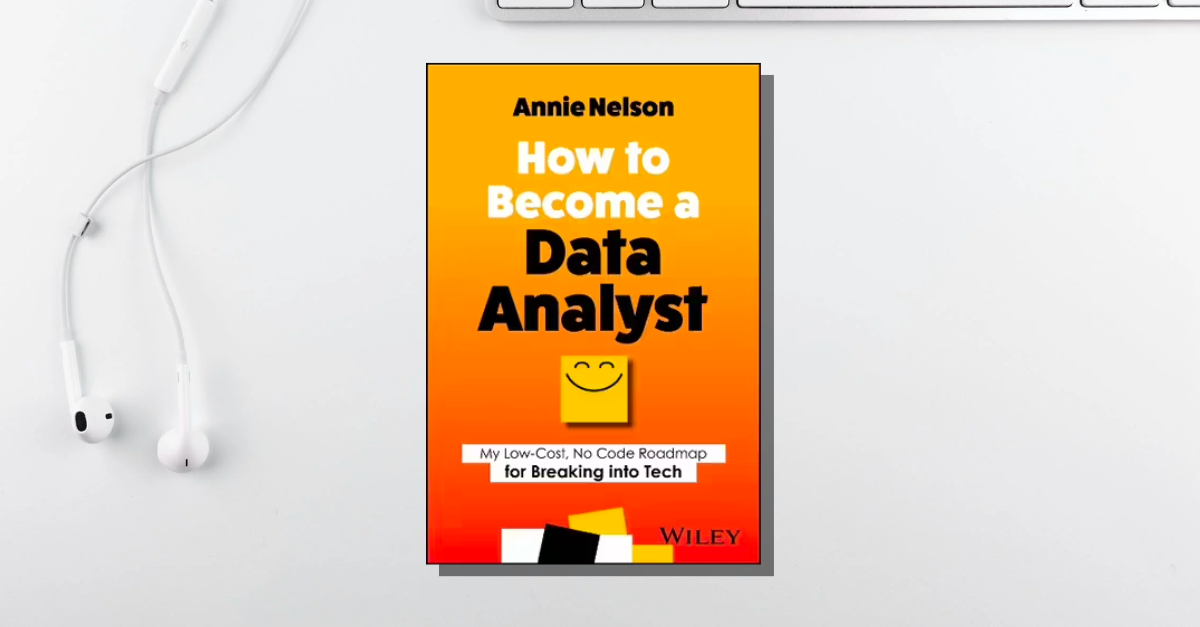My top 5 takeaways from How to Become a Data Analyst
Posted on: February 26, 2024
Post Category: Book Notes

Annie Nelson got her first data analyst job in 6 months, starting from scratch and learning all the tools herself.
For those who are not familiar with Annie Nelson, she’s a TikTok and LinkedIn content creator who focusses on data analytics content (and she’s quite famous). And about 6 months ago, she became a Tableau Social Ambassador.
Quite recently, she shared her first book (published with Wiley): ‘How to Become a Data Analyst: My Low-Cost, No Code Roadmap for Breaking into Tech’
She goes through her whole journey – learning the tools, building her portfolio and applying for jobs. And she gives actionable advice for people who are looking to get their first data analyst role.
Sure, she doesn’t have great breadth of experience to pull from – she pulls from her own experience and shares anecdotes wherever she can. But the advice is honest, and a lot of what she shares aligns with what more experienced analysts would recommend (at least from what I’ve read anyway); building a portfolio, knowing how to approach a project, building your network, etc. are all covered and are covered well.
For a book targeted towards aspiring analysts, it does enough – it gets to the point and it’s an easy read. And I’d recommend to anyone starting out.
So here are the 5 key takeaways I took from the book:
(Note that these takeaways don’t cover everything in the book)
1. Critical thinking is the most important skill of a data analyst
Among other soft skills (like planning, organisation, collaboration) and even hard skills, critical thinking is often mentioned among many analysts as the most important skill.
It is the ability to engage with business problems/needs and arrive at your own conclusions.
There is more than one way to deliver something; part of your job is figuring out the best way.
For example, you may write two SQL queries that produce the same output. And part of your job is figuring out and using which is faster and less expensive.
2. Have a roadmap/plan for your data analyst-learning journey
Without the structure of a bootcamp or Uni program, it’s good to define a roadmap/plan so you don’t waste time and money.
Annie’s roadmap consisted of the following: (1) Skill development (through online courses), (2) Building your portfolio, (3) Getting ready for your job search (by building your profile, networking, resume-writing, etc.).
And this process doesn’t have to be sequential; you can go back to learn more skills and build more projects.
3. Build a portfolio
Building a portfolio helps you showcase your skills.
To help you get started, work through clean beginner-friendly datasets and guided projects, and focus on putting your skills into practice, before trying to make it perfect.
(places to find datasets)
Identify the project/dataset and the tools you’re going to use, work through it, then publish and share your work publicly.
4. Have the essentials before applying for positions
Craft a tailored up-to-date resume, have a strong portfolio, know how to talk about your skills – and on top of that, optimise your LinkedIn, and network.
- Have an updated and tailored resume (that’s one-page and human-scannable).
- Have a solid portfolio (with 2+ projects per essential skill, like SQL, Excel and Tableau or Power BI).
- Practice answering common interview questions and talking about the skills on your resume.
- And on top of that, build your public image: have an optimised LinkedIn profile and build your network.
For your LinkedIn profile, follow creators who offer advice on optimising your profile, tailor your work history, have a good profile picture, and avoid putting “aspiring data analyst” in your headline – put the job you want.
Network by sending personalised requests on LinkedIn and going to networking events (but above all, build strong connections with shared interests).
5. Know how to navigate the common application stages
Be prepared for the: phone screen, meeting with the hiring manager, behavioural interview, technical interview, and panel interview.
Always close the interview asking about next steps and when they expect to get back to you. And know how to ask good questions.
Here’s a quick breakdown of each stage:
- Phone screens are often the company’s first point of contact with you – to check at a high-level that you are a good fit for the role. To prepare, practice your elevator pitch, practice talking briefly about your skills, know the job description, and have your resume in front of you.
- Meeting with the hiring manager can happen during the phone screen – but it’s an opportunity for them to tell you about the company and role. Make sure you research the company well and ask good questions.
- For behavioural interviews, you’ll find a decent sample of what you’ll be asked by Googling some of the common interview questions. Ensure you can draw a straight line between your answers and the requirements of the role; that will help you stand out.
- Technical interviews can come in the form of a live (coding) exercise, or take-home assignment, and they’re used to assess your approach and thought process to a problem (more than anything). DataLemur and HackerRank are good platforms to prepare for SQL interviews, and be prepared to take interviews that are intentionally difficult.
- Panel interviews are often a combination of the technical and behavioural interview, with a panel of interviewers. For the behavioural side, they want to see how you converse with the team, think about the role and talk about your background. For the technical side, you may present a take-home assignment or previous piece of work you’ve done. Keep your language simple, keep the tone conversational, and be relaxed.
When you ask questions to interviewers, make sure you do two things: (1) inquire something that you are genuinely interested in, and (2) demonstrate your value. Asking good questions will signal that you’re a skilled valuable candidate.
Some resources that may help you:
- Teal
- Maven Analytics (with their “Launching Your Data Career” course)
- Data/interview content creators
- GenAI
For more data analytics/science content, follow me on LinkedIn or read some of my other blog posts.

About the author
Jason Khu is the creator of Data & Development Deep Dives and currently a Data Analyst at Quantium.
Notice:
Let me know if you want a resume review from me.
I have written a Data Analyst resume checklist, which will be free for you to read when my Data Analyst Guide gets released on the 3rd of June, 2024.
But if you want specific feedback from me, delivered in a short 30-minute to 1-hour call...
Please let me know through LinkedIn, and I'll see what I can arrange!
Pricing TBD.
- Jason